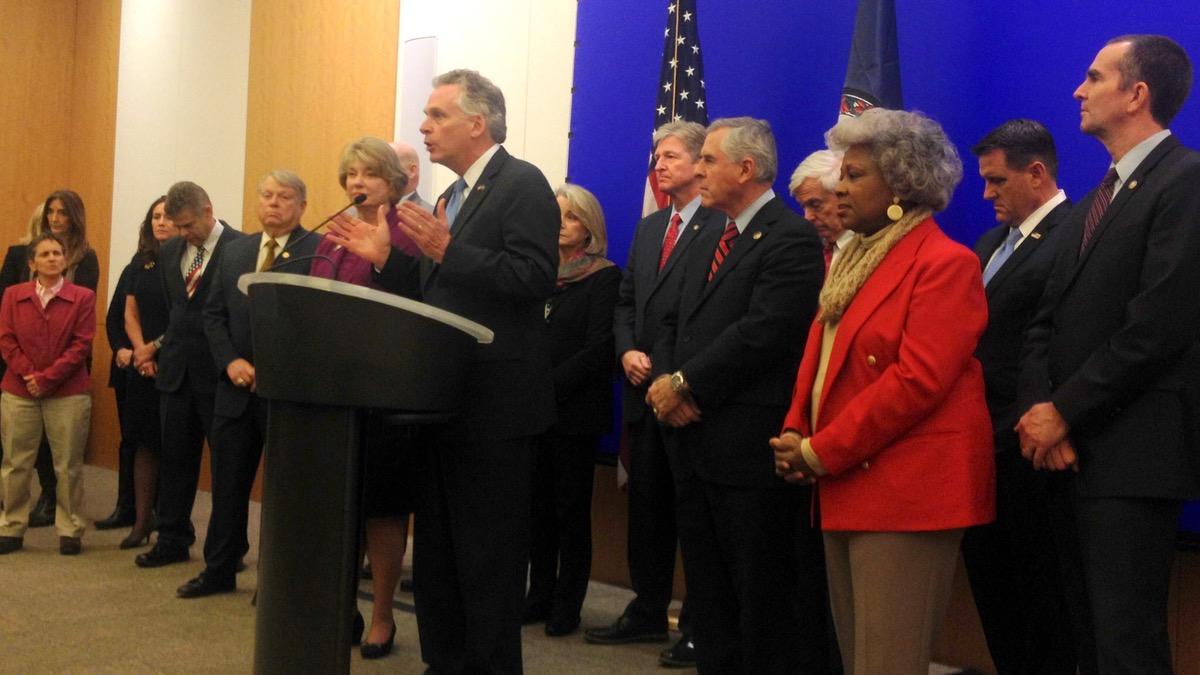Virginia officials reach compromise on gun laws
State officials from both political parties have reached a sweeping compromise on gun laws that would continue Virginia’s agreements with other states regarding concealed carry permits, prevent the subjects of protective orders from possessing guns and encourage, but not require, background checks at gun shows.

By Rachel Beatrice | Capital News Service
For reference, check out our full list of firearm-related bills introduced at the General Assembly this season, including which bills are still alive and which are dead in the water.
— ∮∮∮ —
State officials from both political parties have reached a sweeping compromise on gun laws that would continue Virginia’s agreements with other states regarding concealed carry permits, prevent the subjects of protective orders from possessing guns and encourage, but not require, background checks at gun shows.
Gov. Terry McAuliffe–accompanied by Democratic and Republican lawmakers–announced the agreement Friday, calling it “the first meaningful steps on preventing gun violence in 23 years.”
“I have always believed that these gun issues are nonpartisan issues and there is room for more bipartisan cooperation in reaching this goal,” says McAuliffe.
House Speaker William Howell, a Republican from Fredericksburg, agreed. He credited McAuliffe, Attorney General Mark Herring and Brian Moran, the state’s secretary of public safety, as well as GOP leaders such as Sen. Bryce Reeves of Fredericksburg and Del. L. Scott Lingamfelter of Woodbridge.
“This is not an area where many people would have predicted an accord, but we are here because of their hard work,” Howell said.
In the deal, each side got something: Republicans got Herring to reverse his decision to revoke the reciprocal agreements Virginia has with 25 states on honoring one another’s concealed handgun permits. And Democrats got Republicans to restrict access to firearms in domestic violence situations and possibly expand criminal background checks at firearms shows.
“Protecting reciprocity for Virginia’s law-abiding citizens was a major priority for the House of Delegates,” Howell said. “We have achieved an agreement that will ensure the constitutional rights of Virginians are protected. We are also sending a clear signal about the mutual willingness of both parties to protect victims of domestic violence. This a good deal for the commonwealth.”
McAuliffe and other officials discussed the agreement at a press conference at the state Capitol. The atmosphere was lighthearted and joyful–leaving little room for disagreement.
“I have been elected to the Senate of Virginia for the last 25 years, and this is the best press conference I have attended,” Sen. Louise Lucas, D-Portsmouth, said as she was leaving the event. “This is historic. This is something we have been working on ever since I have been here. So I am just so grateful that I survived long enough to see it.”
McAuliffe praised the bipartisan spirit of the agreement.
“No one wants to see guns in the hands of domestic abusers or other dangerous individuals. It is our responsibility as elected leaders to work together in a commonsense way to provide public safety,” he said.
“The measures we are announcing today will save lives. It is that simple.”
Added Reeves: “When you shelve politics and put it aside, it’s amazing what you can accomplish.”
The agreement came about a month after Herring said Virginia would revoke its agreements to recognize the concealed weapons permits issued by 25 states, including North Carolina, Tennessee, and Kentucky. Herring said those states did not meet Virginia’s standards in deciding who qualifies for a concealed carry permit.
Herring’s decision outraged Republicans. Just last week, Lingamfelter sent an open letter to McAuliffe, urging him to delay revocation of the reciprocal agreements.
Under the pact announced Friday, McAuliffe agreed to sign Senate Bill 610, a bill Reeves is sponsoring to reverse Herring’s decision. SB 610 would continue “reciprocity for all states with a concealed carry permitting process.”
But McAuliffe said it also would prevent “state shopping:” “If a person has ever been revoked in Virginia, they cannot go to another state to get a permit and have that permit be recognized in Virginia.”
Also as part of the agreement, the Republican-controlled General Assembly would pass legislation sponsored by Sen. Janet Howell, D-Reston. SB 49 would prohibit a person subject to a permanent protective order from possessing a firearm for the duration of the order. Failing to comply with the law would be a class 6 felony.
McAuliffe said the legislation would plug a “gaping loophole that needed to be filled.” Current law states that a person who is the subject of a protective order may not buy a firearm but still may possess one.
In 2014, Virginia recorded 112 deaths involving family or domestic disputes. Sixty-six of the victims were killed by guns.
“If we can save just one life, we need to do so,” McAuliffe said.
Under the third part of the agreement, the General Assembly would pass and McAuliffe would sign HB 1386, sponsored by Lingamfelter, and SB 715, by Sen. John Edwards, D-Roanoke. These bills address voluntary background checks at firearms shows.
Currently, only federally licensed firearms dealers must perform background checks on people who want to buy guns. The legislation would authorize the Virginia State Police to perform background checks on behalf of private citizens selling guns at the shows.
“This bill requires the Virginia State Police to be present at every firearms show in the Commonwealth to perform background checks on a voluntary basis,” the agreement stated.
-
Recommend this
on Facebook -

Report an error
-

Subscribe to our
Weekly Digest




There are no reader comments. Add yours.